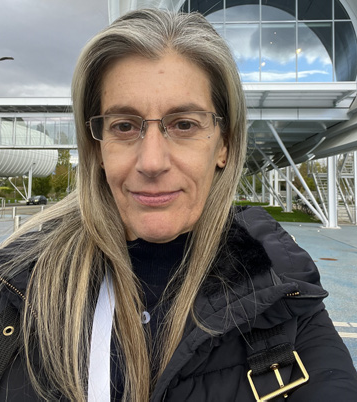Special Issue: Open Science in its many forms - MCAA Policy Working Group - Open Science Initiative: Paving the Way for an Open, Impactful Research Culture
Newsletter
Theodota Lagouri, Chair of the MCAA Policy Working Group and CERN researcher, invites MCAA members to adopt Open Science practices, which will foster a global shift towards equitable research, benefiting professional development and society. The transformative movement in Open Science is redefining research, where transparency and collaboration fuel work that is accessible and impactful.
Bionote
Theodota Lagouri, Research Scientist at CERN and Yale, serves as the Chair of the MCAA Policy Working Group, supporting Open Science as a pathway to impactful and inclusive research. With extensive experience in experimental particle physics and scientific publishing, she promotes initiatives focused on enhancing accessibility and global collaboration. Her work with open- access publications at CERN connects policy and practice to enhance transparency in science. Through her leadership in the MCAA Policy Working Group, she encourages a research culture that values Open Science as essential for professional growth and societal advancement.

Open Science encompasses more than just sharing research; it involves creating an inclusive, collaborative, and impactful environment. In my research work at CERN, I have seen how essential practices like open-access publishing and data sharing significantly enhance visibility and encourage collaboration among diverse research fields.
These approaches enable researchers to advocate for evaluation frameworks that recognize the broader contributions of their work. I encourage MCAA members to embark on this transformative journey toward a research culture where Open Science is fundamental to both professional development and scientific advancement. For example, at CERN, our Open Science policy enhances researchers’ visibility, enabling them to build partnerships with industry and stakeholders, which fosters a vibrant culture of collaboration.
CERN’s commitment to Open Science is evident in the pioneering efforts undertaken to provide open access to publications, data sharing, and public engagement. For example, through partnerships like SCOAP3 and platforms such as arXiv, CERN makes research results freely available, embodying the UNESCO vision for Open Science as an inclusive framework that promotes collaboration and societal benefits. My experience with Open Access publications in experimental physics made me aware of the significance of a commitment to accessibility, demonstrating how improving the availability of research can increase its impact.
The Open Data Portal at CERN is another prime example of Open Science in action, allowing researchers worldwide to access experimental data in accordance with FAIR principles (Findable, Accessible, Interoperable, and Reusable). This initiative enables scientists to build upon findings, verify results, and minimize redundant experiments, thereby accelerating the sharing of knowledge globally. Additionally, Zenodo, developed at CERN, serves as an open-access repository where researchers can publish various outputs — datasets, software, reports, and publications—further advancing transparency and cultivating a collaborative research environment.
Open Science not only enhances credibility but also broadens opportunities for collaboration.
Open-source tools and software developed at CERN encourage researchers to adapt and build upon existing technologies, furthering innovation across disciplines. Platforms like GitHub enable collaborative code sharing, assisting a dynamic community that thrives on problem-solving and innovation beyond institutional boundaries.
Several recommendations for initial practices in Open Science include:
• Open-Access Publishing: Selecting open- access journals or utilizing platforms such as arXiv or Zenodo can facilitate the free sharing of research work.
• Data Sharing: Ensuring data complies with FAIR principles can enhance usability; Zenodo serves as an excellent platform for publishing datasets.
• Open Software and Hardware: Licensing software and tools openly can promote reuse and foster cross-disciplinary innovation.
• Open Peer Review: Engaging in open peer review or publishing review reports alongside preprints can enhance transparency in the research process.
However, despite the immense potential of Open Science, the researchers face several challenges that must be addressed, including:
• Funding: Publication fees can present obstacles, highlighting the need for sustainable funding solutions.
• Data Privacy: Balancing openness with ethical and legal considerations regarding sensitive data is critical.
• Quality and Reproducibility: The rapid pace of open dissemination can compromise quality; clear guidelines are essential.
• Recognition and Incentives: Traditional metrics often overlook contributions to Open Science, which can affect career progression.
• Infrastructure: Many institutions may lack necessary resources for effective data sharing and storage.
• Intellectual Property: Open licensing can conflict with proprietary interests, requiring careful navigation.
To build a culture that values Open Science, collaboration among researchers, institutions, and funding agencies is essential. By addressing these challenges, we can create a supportive environment that encourages and rewards openness in research. Open Science empowers researchers to enhance their work’s transparency, reproducibility, and impact.
As the Chair of the MCAA Policy Working Group (WG), I invite you to engage with our Thematic Group on Open Science Policy in collaboration with OPUS, a European project dedicated to embedding Open Science principles into research evaluation and career advancement. This initiative also aligns closely with my work at CERN, where Open Science is not merely an ideal but a foundational aspect of our research culture. By participating in the MCAA Policy WG’s Open Science Policy initiative, we can come together to advance more relevant and accessible research. Through collective effort, we can work to overcome obstacles, improve accessibility, and shape a research landscape that values Open Science as integral to impactful, ethical, and collaborative research. Additionally, the collaboration between MCAA Policy WG and OPUS will empower MCAA researchers to effectively integrate Open Science into their career development by aiming to develop evaluation frameworks that recognize Open Science contributions alongside traditional metrics, thus promoting a research culture that values both transparency and accessibility for all.
Join the MCAA Policy Working Group.
Theodota Lagouri
Chair, MCAA Policy Working Group
policy@mariecuriealumni.eu
@mcaa_policy_wg
